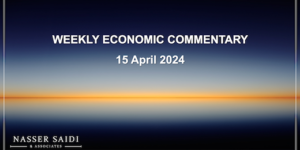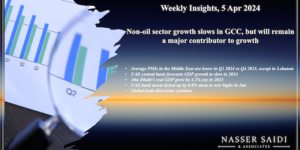Markets
Global markets rose as company earnings from Asia and US beat expectations, but slowing US economic growth restored fears of a global slowdown, leading to session losses on Friday. Regional markets were mostly up last week, with the exception of Abu Dhabi and Morocco. The Fed’s downbeat outlook and fragile data on jobs sent the dollar to a three-month low on a trade-weighted basis on Thursday, with the yen closing at a 8-month high on Friday. Dubai CDS spreads narrowed despite the ongoing negotiation on DP World debt, as oil prices were resilient even after the weak US GDP data. The gold price is retrenching and traders do not foresee a turnaround.
Global Developments
Global Developments
Americas:
- US Q2 2010 GDP showed a moderation in growth, rising only 2.4% qoq annualized (Q1 was revised up to 3.7% from the 2.7% previously reported) amid swelling trade deficits resulting from a rebound in imports.
- New home sales data posted healthy readings, rising 23.6% mom in June. The Case-Shiller home price index was up 0.5% mom in May and seems to be tracking in the +3% to 4% yoy range.
- Durable goods orders fell in June (-0.1% mom), taking Q2 growth to 9.2% qoq, saar (Q1: 25.5%). In contrast, orders for non-defense capital goods, excluding aircraft, grew 25.1% in Q2, accelerating from 15.1% in Q1.
- Initial jobless claims declined by 11,000 to 457,000 in the week to July 24, signaling a sluggish labor market.
- Chicago PMI for July rose 3.2 points to 62.3 with sub-indexes for new orders and order backlogs rising by 5.5 points to 64.6 and 6.9 to 57.6, respectively.
Europe:
- The Basel Committee has proposed rule changes on capital and liquidity. The German regulator, BaFin, declined to agree to the new rules, arguing that it needed more time to assess their likely impact.
- Euro zone economic sentiment rose to a 28-month high in July (101.3; Jun: 99) while German unemployment fell to its lowest level since November 2008 to 3.211 mn, boosting hopes for a pickup in the consumer sector.
- EU unemployment rate remained stable at 10%, while flash estimates for July inflation showed a 20-month high, on rising energy costs, at 1.7% (Jun: 1.4%)
Asia and Pacific:
- India’s central bank hiked policy rates for a second time this month – reverse repo rate is up 50bp to 4.5% and repo rate by 25bp to 5.75% – in the face of double-digit inflation and a strengthening domestic economy.
- The Korean economy grew 1.5% qoq in Q2 2010, thanks to its competitive export and manufacturing sectors, despite the weakness in domestic consumption and construction investment.
- China PMI fell to 51.2 in July from 52.1 in June, reflecting a decline in both the sub-indices on new export orders and import orders.
- Japan’s retail sales rose by 0.5% qoq, saar, in Q2, which supports the view of a sharp decline in Q2 growth.
- Japan’s Industrial Production was weaker than expected, falling 1.5% mom in June, taking Q2 overall to only 5.8% qoq (saar); by contrast Thailand IP growth accelerated in June – manufacturing output rose 21.3% yoy (May: 17.5%); Korea’s IP was up a solid 1.4% mom in June (Q2: 20.8% qoq, saar).
- Thailand’s exports jumped 47.1% yoy in June to a record $17.9 bn, as per data released by the central bank. Imports rose 38.3%, widening trade surplus to $2.5 bn in June (May: $ 2.3bn).
Bottom line:
The data last week depicted a contradictory picture on the global economy. The corporate earnings overall beat expectations but growth in the US and in China is faltering. The job market weakness in the US is a drag on future prospects, but at least the house market is finding some traction and investment in capital goods is strong. The surprise comes from Europe where Germany is poised for a strong Q2 performance and the spreads of peripheral government bonds with the Bunds are narrowing consistently. History shows that the summer has a dichotic pattern; either it is a period of lull or it is marked by unexpected crises (the invasion of Kuwait, the demise of Lehman Brothers). We hope for the former.
Regional Developments
- Oman posted a surplus of OMR 421.2mn in Q1 2010, as oil revenue shot up by almost 101% to OMR 1.4bn, against an estimated budgetary deficit of OMR 800mn for full year 2010.
- UNCTAD data showed that FDI flow out of UAE totaled USD 53.5bn in 1990-2009 – emerging as the largest capital exporter in the Arab region. Saudi followed with USD 40.3bn and then came Qatar with USD 16.03bn.
UAE Focus
- Nakheel has proposed to repay its bank debt after five years, while paying another outstanding USD 1.85bn syndicated Islamic loan (due 2012) after seven years. (Source: Emirates 24/7)
- DP World has announced that it handled 23.7 mn TEU across its 50 operating terminals in H1 2010, an increase of 16% yoy. Volumes grew 7% to 13.2 mn TEU, largely on terminals based in Asia.
- Capital flows into the UAE recorded one of their biggest declines of nearly 71% to USD 4bn in 2009, according to the latest UNCTAD report. The report projected a recovery in such flows this year and in the medium term.
- Emirates NBD has announced that it is in the process of raising USD 250 mn through auto loan securitization, with the deal to be completed by mid- August.
- Dubai Airports announced a 16.3% yoy rise in passenger traffic to 22,554,445 (till June 2010). Cargo volumes, meanwhile, rose 26% to 1,101,856 tonnes in the same period.





